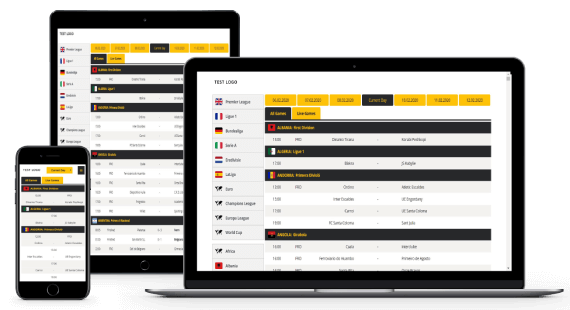
Football, the most popular sport in the entire world, produces tremendous volumes of information within a minute: goals and assists, player movements, and match statistics. In the modern era of digital culture, this information drives such aspects as live score websites, fantasy leagues, betting sites, and sports analytics applications. This is all made possible by the most critical technology of all: the Football Data API, a connection point with raw match data and the apps, websites, and dashboards that millions of people interact with daily.
What Is a Football Data API?
Football Data API is an application programming interface that offers structured, real-time, and historical data about football matches, teams, players ,and competitions. It is a digital pipeline that allows developers, analysts, and businesses to access the correct and current football data without having to manually compile it from various sources.
Instead of scraping websites or relying on delayed updates, an API delivers organized data in a consistent format. This allows developers to easily integrate live scores, standings, match events, and statistics into their products. From a fan’s mobile app showing live commentary to a coach’s analytics tool for performance review, everything relies on football data APIs.
Why Football Data Matters
Football is not only about what happens on the pitch — it’s about data-driven insights. Each match produces hundreds of data points: player touches, shot accuracy, distance covered, fouls, and more. When this data is collected, analyzed, and shared through APIs, it creates value in several ways:
- For Fans: APIs make it possible to view real-time scores, player stats, and league tables instantly on apps and websites.
- For Clubs and Analysts: Teams use APIs to track player performance, evaluate opponents, and make tactical decisions.
- For Broadcasters: Sports channels integrate API feeds to display live graphics, statistics, and comparisons during coverage.
- For Businesses: Betting platforms, fantasy football apps, and sports data providers depend on these APIs for accuracy and fairness.
In short, football data APIs turn raw match information into accessible insights that drive fan engagement, professional decisions, and business opportunities.
Key Features of a Football Data API
A well-designed Football Data API provides a comprehensive and flexible way to access the following types of data:
- Match and Fixture Information
APIs deliver schedules, match results, live scores, and match status updates. They allow users to track when and where a match is happening, who is playing, and what the current score is — all updated in real time.
- Player and Team Details
From basic player profiles like name, nationality, and position to detailed statistics such as goals, assists, and passes completed, APIs help users monitor player performances across seasons. Similarly, team data includes logos, squad details, and performance history.
- League and Tournament Data
APIs often cover global and regional competitions — from the English Premier League and UEFA Champions League to local tournaments. They include information about standings, points, wins, losses, and goal differences.
- Historical Data
Historical match data is invaluable for analysis and research. APIs often maintain years of past results and player stats, allowing developers to create predictive models, trend analyses, and comparison tools.
- Real-Time Match Events
Advanced APIs provide minute-by-minute updates, including goals, substitutions, yellow and red cards, injuries, and penalties. This makes them essential for live commentary, fantasy sports scoring, and betting applications.
- Advanced Metrics
All Sport Live offer deep analytics such as expected goals (xG), heatmaps, passing accuracy, and possession percentages — critical for professional performance analysis and scouting.
Benefits of Using a Football Data API
- Speed and Efficiency
APIs save enormous time by automating data collection and updates. Developers don’t have to manually input scores or refresh statistics — the API keeps everything up to date automatically.
- Accuracy and Consistency
Reputable API providers ensure that all information is verified and standardized. This consistency is crucial when dealing with global football data, where leagues, teams, and player names can vary in format.
- Scalability
Whether it’s a small website showing daily results or a global fantasy sports platform serving millions, an API can handle large amounts of data and traffic efficiently.
- Innovation and Flexibility
APIs empower developers to create unique football experiences — from AI-driven predictions to interactive dashboards and mobile apps. The flexibility of data integration encourages creativity and innovation.
- Real-Time Engagement
Fans today expect updates instantly. APIs enable apps and websites to deliver real-time notifications and live coverage that keep audiences engaged throughout the match.
How Football Data APIs Are Used
- Fantasy Football Platforms
Fantasy sports platforms depend heavily on APIs for real-time player performance updates. Points are automatically awarded or deducted based on accurate, live data.
- Sports Betting
Betting websites use APIs to receive live odds, match results, and player stats. Quick data delivery ensures fair play and accurate market updates.
- Mobile Apps and Websites
Sports news apps and football portals integrate APIs to display scores, tables, and match statistics without manual effort.
- Sports Analytics
Analysts and scouts use API-driven data to study player form, injury history, and tactical strengths or weaknesses, helping clubs make informed recruitment and training decisions.
- Broadcasting and Media
TV and online broadcasters integrate football APIs into their live coverage systems. This allows them to show dynamic graphics like player comparisons, heatmaps, and performance breakdowns on screen.
Choosing the Right Football Data API
When selecting a Football Data API, consider the following factors:
- Coverage: Ensure it includes leagues and tournaments you need — local, national, or international.
- Accuracy: Data should be verified, timely, and sourced from reliable providers.
- Update Frequency: For live applications, you’ll need updates within seconds, not minutes.
- Ease of Integration: Look for well-documented APIs that are easy for developers to connect.
- Scalability: If you plan to expand your app or user base, the API should handle growing demand.
- Pricing: Many APIs offer free tiers for basic data, while premium plans include advanced metrics and broader coverage.
- Support and Reliability: Technical support, uptime guarantees, and detailed documentation are vital for professional use.
The Future of Football Data APIs
The future of Football Data APIs is moving toward real-time analytics and predictive intelligence. With advancements in computer vision, machine learning, and wearable technology, new data sources are emerging — such as player tracking, biometric stats, and AI-driven tactical analysis.
Football Stats API won’t just tell us who scored — they’ll predict who might score next. Fans will enjoy deeper insights, and clubs will make smarter decisions using predictive data models integrated through APIs. Additionally, blockchain technology and decentralized data sharing are expected to improve data transparency and ownership across the sports ecosystem.
FAQs about Football Data API
- What is a Football Data API used for?
A Football Data API is used to access structured football-related information such as match results, player statistics, team standings, and live scores. It allows apps, websites, and analytics tools to display and analyze football data in real time without manual updates.
- Who can benefit from using a Football Data API?
Football Data APIs are valuable for a wide range of users — including developers building sports apps, fantasy football platforms, betting companies, broadcasters, data analysts, and football clubs seeking detailed performance insights.
- Is Football Data API data updated in real time?
Yes. Most professional Football Data APIs provide real-time updates for ongoing matches. This includes live scores, in-match events, and updated standings that reflect changes as soon as they happen on the pitch.
- Do Football Data APIs include historical data?
Many APIs include extensive historical databases that cover past seasons, matches, and player performances. Historical data is especially useful for analysts, researchers, and developers creating predictive models or trend analyses.




